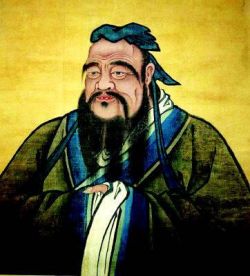Difference between revisions of "Confucius"
imported>Ciic |
imported>Ciic m (Protected "Confucius" ([edit=sysop] (indefinite) [move=sysop] (indefinite))) |
||
| (28 intermediate revisions by the same user not shown) | |||
| Line 1: | Line 1: | ||
| − | [[File:Confucius.jpg|thumb|Confucius]] | + | [[File:Confucius.jpg|thumb|250px|Confucius, philosopher in Chinese history.]] |
'''Confucius''' ('''孔子''' '''551-479 BC''') was a Chinese teacher, editor, politician, and philosopher of the [[Spring and Autumn Period]] of Chinese history. The philosophy of Confucius emphasized personal and governmental morality, correctness of social relationships, justice and sincerity. | '''Confucius''' ('''孔子''' '''551-479 BC''') was a Chinese teacher, editor, politician, and philosopher of the [[Spring and Autumn Period]] of Chinese history. The philosophy of Confucius emphasized personal and governmental morality, correctness of social relationships, justice and sincerity. | ||
| − | Confucius toured various states to advocate his ideas on right conduct, in order to shore up aristocratic rule. | + | Confucius toured various states to advocate his ideas on right conduct, in order to shore up aristocratic rule. According to the ''Zuo Zhuan'', Confucius returned home when he was 68. He spent his last years opening schools and teaching 3,000 students. Among them, seventy-two were noted scholars who helped compile ancient books and put his teachings into the book titled ''The Analects''. |
For 2,000 years, Confucianism was the dominating force in the feudal society of China, exerting a significant impact on the stability and moral principles of society. Having spread to East and Southeast Asia, his thinking became an important guiding ideology in many countries, making Confucius a world-level thinker. | For 2,000 years, Confucianism was the dominating force in the feudal society of China, exerting a significant impact on the stability and moral principles of society. Having spread to East and Southeast Asia, his thinking became an important guiding ideology in many countries, making Confucius a world-level thinker. | ||
| − | Confucius | + | In Chinese history, Confucius was the first great teacher who carried out large scale education which was open to all people regardless of being poor or rich. His principles had a basis in common Chinese tradition and belief. He championed strong family loyalty, ancestor worship, respect of elders by their children and of husbands by their wives. He espoused the well-known principle "Do not do to others what you do not want done to yourself." |
| − | |||
[[category:people]] | [[category:people]] | ||
| + | [[Category:Culture]] | ||
Latest revision as of 03:32, 11 September 2014
Confucius (孔子 551-479 BC) was a Chinese teacher, editor, politician, and philosopher of the Spring and Autumn Period of Chinese history. The philosophy of Confucius emphasized personal and governmental morality, correctness of social relationships, justice and sincerity.
Confucius toured various states to advocate his ideas on right conduct, in order to shore up aristocratic rule. According to the Zuo Zhuan, Confucius returned home when he was 68. He spent his last years opening schools and teaching 3,000 students. Among them, seventy-two were noted scholars who helped compile ancient books and put his teachings into the book titled The Analects.
For 2,000 years, Confucianism was the dominating force in the feudal society of China, exerting a significant impact on the stability and moral principles of society. Having spread to East and Southeast Asia, his thinking became an important guiding ideology in many countries, making Confucius a world-level thinker.
In Chinese history, Confucius was the first great teacher who carried out large scale education which was open to all people regardless of being poor or rich. His principles had a basis in common Chinese tradition and belief. He championed strong family loyalty, ancestor worship, respect of elders by their children and of husbands by their wives. He espoused the well-known principle "Do not do to others what you do not want done to yourself."
